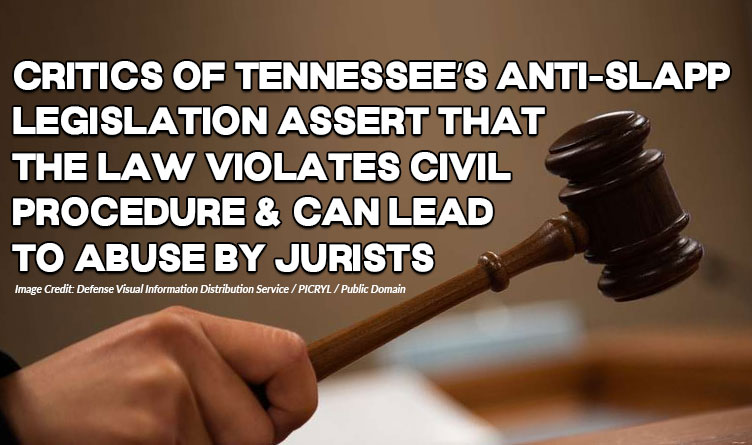Does Tennessee’s Anti-SLAPP Legislation Prevent Frivolous Lawsuits And Protect Free Speech, Or As Michelle Foreman Has Recently Experienced, Does It Offer A Capable Weapon That Can Be Wielded Against A Political Opponent?
Image Credit: Defense Visual Information Distribution Service / PICRYL / Public Domain
The Tennessee Conservative [By Kelly M. Jackson] –
In a defamation lawsuit filed this past summer by former Republican legislative candidate Michelle Foreman against Dave Rosenberg, a former member of Nashville Metro Council, Circuit Court Judge Lynne Ingram ruled in favor of Rosenburg who asserted that the suit constituted a Strategic Lawsuit Against Public Participation, or a SLAPP suit.
Back in 1997, the state of Tennessee passed a law that was designed to address the issue of frivolous lawsuits triggered by speech that the plaintiff of the suit found disagreeable, which would then target the person who used that speech with expensive lawsuits. The ultimate goal being the quelling of their speech in the future.

To some degree, there is merit in such laws, in that free speech should be protected from intentionally harmful civil litigation, often perpetrated by large corporations filing suits against individuals for defamation when in fact the speech used does not meet the legal standard for such a claim.
Typically, the litigant who engages in such a practice doesn’t do so to protect their reputation as much as they do it to quell the speech of the plaintiffs and any potential plaintiffs that may decide courage is contagious.
Perhaps such laws were created with good intention. However, recent additions to the law have created an opportunity for jurists that may be so inclined, to interrupt procedural due process all citizens are guaranteed by the constitution.
In 2019 the laws in Tennessee were expanded in such a way that it can allow for the interruption of a civil proceeding, violating the rules of civil procedure and depriving a petitioner of the court their right to be heard and judged by a jury of their peers.
This appears to have been the case in Foreman V Rosenburg.

In the suit filed earlier this year, Foreman filed a $300,000 defamation suit against Rosenberg, after Rosenberg referred to her as a “a truly-unhinged politician who is a COVID denier, anti-vaccine, supports Jan. 6 and election conspiracy theories, and is a pathological liar” in an October 2022 newsletter.
At the time when this newsletter was proliferated to thousands of email addresses, Foreman was running for the Tennessee House in District 59, against incumbent Democrat Caleb Hemmer. Rosenburg was a supporter of Hemmer, using social media posts as his primary source of evidence.
Foreman filed a defamation lawsuit asking the court for damages in the amount of $300,000. Foreman, an attorney, was confident that she would be able to prove to a jury that Rosenburg had if not recklessly, but rather intentionally impugned Foreman’s character with the express purpose of damaging her ability to successfully campaign for office.
She would, however, be deprived of this opportunity, because of the expansion of the anti-SLAPP legislation. And all before a thorough discovery process could be completed, a right that is guaranteed by the 14th amendment. Rosenburg was allowed to request an immediate disposition of the case, which the Judge granted.
Rosenburg based his request on the basis that he was exercising his 1st Amendment right, and that his speech did not reach the legal standard of defamatory, to which the judge agreed.
Additionally, because Rosenburg’s petition was granted, Judge Ingram hit Foreman with $100,000 in sanctions, according to her ruling, in order to deter Foreman from having any inclination to defend herself in a future civil proceeding even if it were warranted.
Judge Ingram, a Democrat, incidentally, lives in the very district where Hemmer ran for and was reelected to his seat.

The Tennessee Conservative reached out to Foreman who made the following statement:
“We live in a society where defamation has become normalized, and with e-mail and social media, we have more and more people perpetuating that defamation and not thinking twice about it. Currently, I am facing some of the most egregious, false allegations I have ever heard, and I am being attacked in my professional, political, and personal life. When someone egregiously and maliciously makes false allegations about me, that are intentionally meant to harm my reputation and good name, and they publish those lies, I have a right to defend myself legally, and I will.”
Does anti-SLAPP legislation prevent frivolous lawsuits and protect free speech, or as Michelle Foreman has recently experienced, does it offer a capable weapon that can be wielded against a political opponent?
In our current political climate, where the law has been weaponized against conservatives in just about every way possible, it seems this is just one more to add to that ever-growing list.


About the Author: Kelly Jackson is a recent escapee from corporate America, and a California refugee to Tennessee. Christ follower, Wife and Mom of three amazing teenagers. She has a BA in Comm from Point Loma Nazarene University, and has a background in law enforcement and human resources. Since the summer of 2020, she has spent any and all free time in the trenches with local grassroots orgs, including Mom’s for Liberty Williamson County and Tennessee Stands as a core member. Outspoken advocate for parents rights, medical freedom, and individual liberty. Kelly can be reached at kelly@tennesseeconservativenews.com.



2 Responses
Why didn’t she sue for slander?
Get out of the big cities and they will devour themselves.